“You’re going to run out of paper,” my mom used to say as she watched me do homework. If I didn’t like how a letter looked, I’d start all over again. Sometimes it took a few pages to even make it past my name, which was the first thing written atop every assignment. She called it perfectionism, which I disagreed with: it didn’t have to be perfect, it just needed to look right.
My guess is that it started in response to the UC, or ulcerative colitis; my original IBD diagnosis before the Crohn’s switcheroo. There was a lot I couldn’t control as a kid, grisly stuff involving my body, but damned if I couldn’t make sure my homework looked tidy. Eventually I stopped wasting as much paper, either because my penmanship improved or because I accepted with some resignation that while my body was mine in theory, in practice I shared it with a mercurial immune system that wasn’t above declaring eminent domain now and then.
Lately I’m ruefully reminded of that perfectionism every time I open drafts of my upcoming reviews or lose control of a paintbrush or a flimsy wooden window frame that’s tinier than the tip of an index finger. It’s not as bad as copping to memory failures — speaking of which, this evening I discovered while preparing her April dose that I’d neglected to give Muriel last month’s Heartgard — but it’s humbling to have to stop what you’re doing and admit it’s not a great time to wield an X-Acto knife or engage in precision gluing, as I did earlier after almost slicing myself a couple times.
It helps to remind yourself that it’s temporary: my dumb illnesses might be permanent but other than the missing intestines that’ll never return, everything else can wax and wane. With YOPD in particular, you might be a menace with Gorilla Glue as your medication wears off and regain your abilities two hours later, at the peak of your next dose. One day they’ll be gone for good, but that could be several decades in the future and a bus could hit you first. Or a sedan.*
Over the last year, since realizing with some horror that the medical resolution to my arm woes wouldn’t be as simple as we hoped, I’ve tried to laugh at my mistakes rather than feel sad or angry. Progress mostly came in fits and starts until I started working on projects involving miniatures and models. Now I engage those muscles daily and amused acceptance of my mistakes comes easier — there’s something inherently funny about a so-called perfectionist attempting something she’ll never be good at.
“You’re weird, but I’m totally here for you digging into your complete insanity,” Best Friend said a couple weeks ago, after I divulged some of my diorama plans. As the conversation continued and he realized I’d agreed to make Crankenstein a log cabin once I’m done with the lighthouse, he joked “I am worried you have embraced being an autistic fuck a bit too much. You are a lot more than your damaged brain.”** If miniatures and models seem weird to anyone else, the reality is likely different than what you imagine.
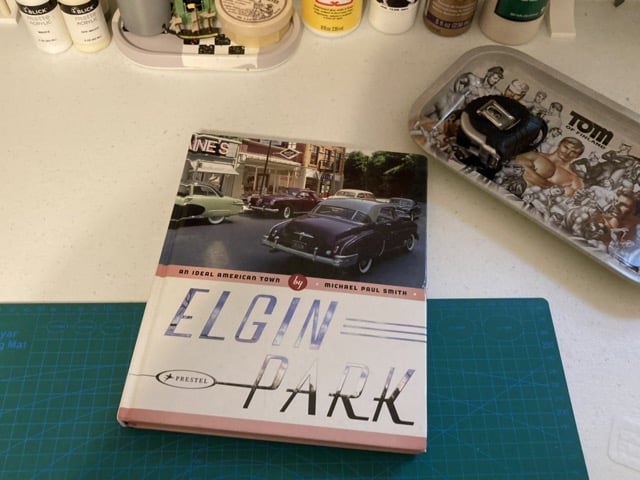
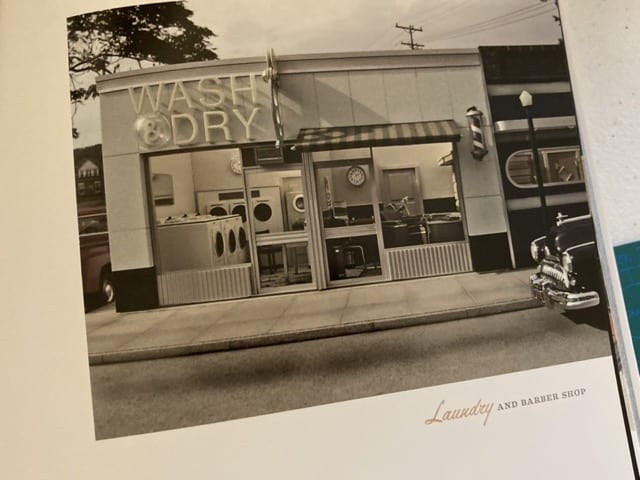
My favorite artist in this medium might be the late Michael Paul Smith, who sought refuge in model-making due partly to the homophobic bullying he endured as a kid. He was the subject of a great National Geographic video that gives you an idea of his spectacular talent and explains some of the allure of these solitary hobbies that let you wander off in search of lost time. The kits I’m currently working on (or about to start) all capture bygone eras. Some will only take an hour or two in total to complete, others a few days. Everything you end up with is tiny, particularly in this scale:
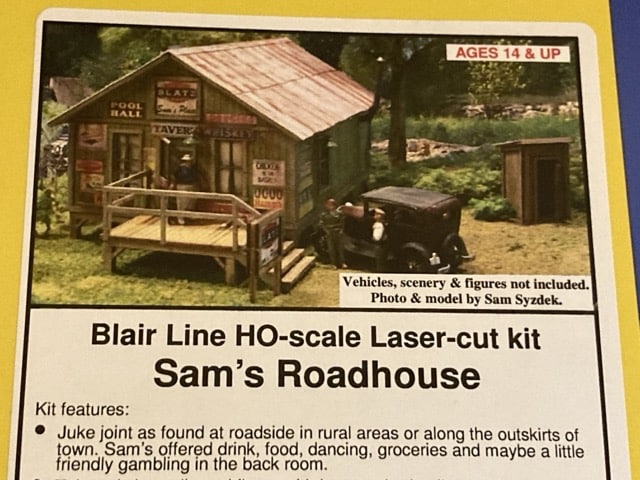
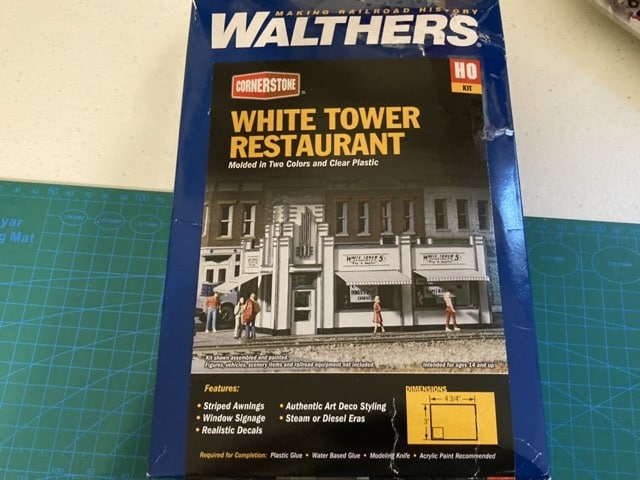
The first kit is thin wood, the second plastic, and I like to snag these at discounts after buyers who didn’t read the descriptions angrily return them. They think they’re purchasing what’s pictured, but what you get is a bundle of unfinished parts to complete and assemble with whatever supplies you have on hand. The finished product fits in your palm. You can try to replicate the box art if you want, but you might just use it as a starting point. I’m not going to create a ‘White Tower,’ I’ll probably craft mine as a retro Steak ‘n Shake.
Faster projects, which are again packets of materials you assemble and finish as you please, often involve furniture or other details you can place in or around your models, like these:
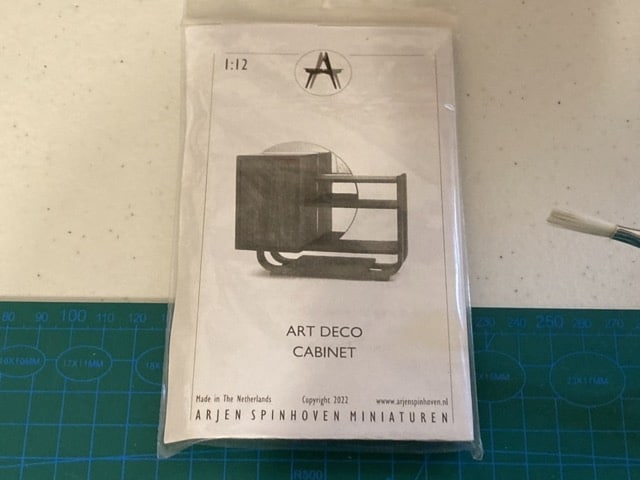
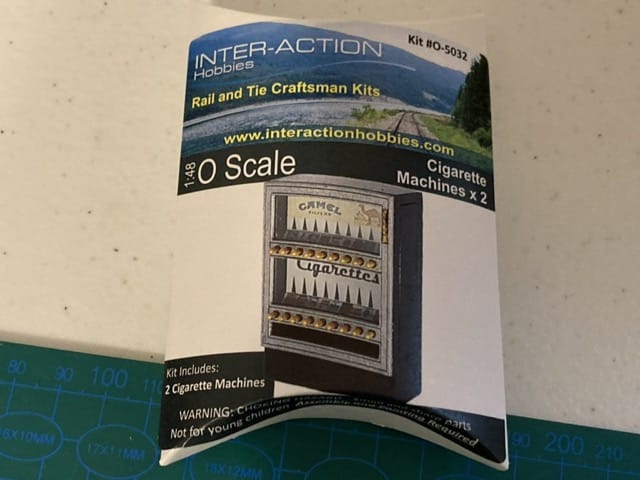
The cabinet will go in a house; the cigarette machines are diorama-bound, possibly to end up in recreations of childhood landmarks. Even the lighthouse bathroom fixtures (which I sleepily called ‘furniture’ in a previous post) are projects. Today I cut the faucets, tub claws and toilet paper roll from their flashing, sanded the leftover nubs, washed it all with dish soap, and once it dried set to work on priming.
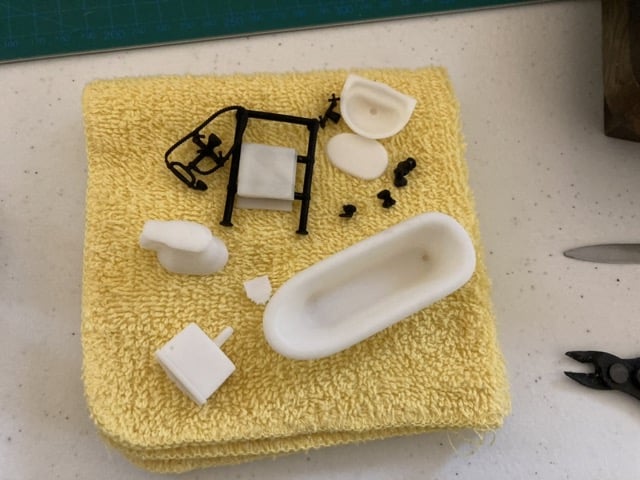
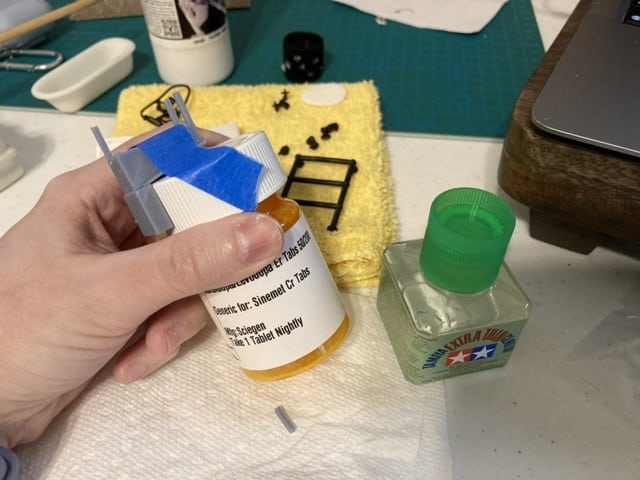
By the time I taped an unfinished KISS pinball machine to an empty pill bottle to hold it (relatively) still, a trick learned from miniature artists who work on almost microscopically small Dungeons & Dragons game pieces, my paint-speckled hands were uncooperative. After repeatedly botching my attempt to glue its leg, which broke in transit, I called it a day; Crankenstein said she’ll try fixing it herself if my luck doesn’t improve, but it’s delicate enough that the seller might need to replace it completely. After my 10th or so dexterity fail, I had to laugh at the label on the bottle — it’s for my bedtime dose of levodopa.
* There’s no easy way to casually mention this, but a few months ago I was almost hit by two different cars as a pedestrian due to my own stupidity. It’s an odd story if you understand that I’m someone who refuses to jaywalk, but even without that context it would probably still sound weird. I’d like to write about it sometime this month but it’s going to be quite a hit to my ego, which is obviously a lot better than the hits I would’ve taken to my body had the drivers not been alert. That Crankenstein was there to see it made it even worse.
** If you’re new here, Middle Sister once called me “a stupid autistic fuck who doesn’t understand anything.” She said it in genuine frustration during a disagreement and probably doesn’t remember it — my siblings and I say a lot of colorful things to each other and with the exception of Youngest Sister, no one holds a grudge — but it’s become part of the lexicons I share with Best Friend and Crankenstein.